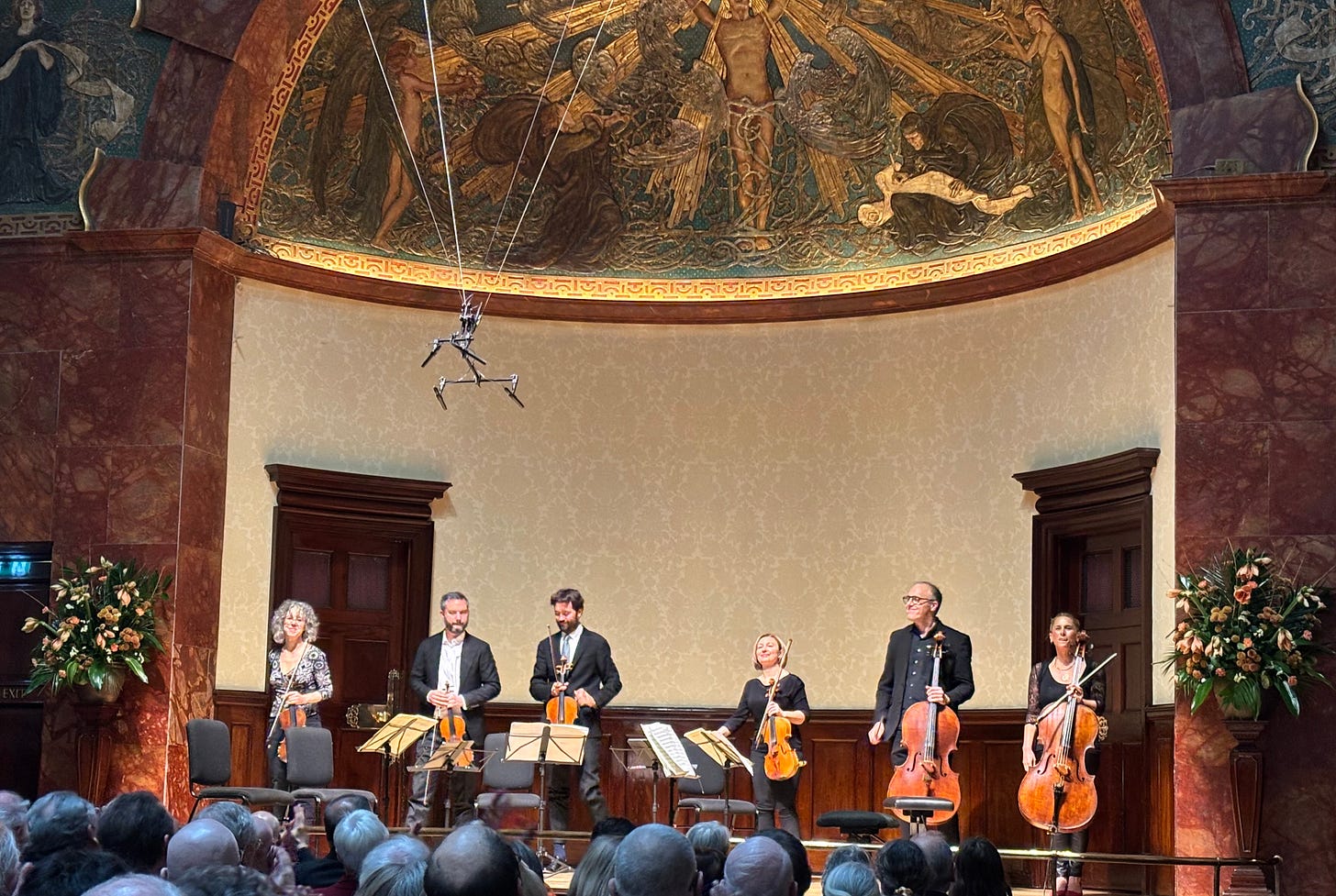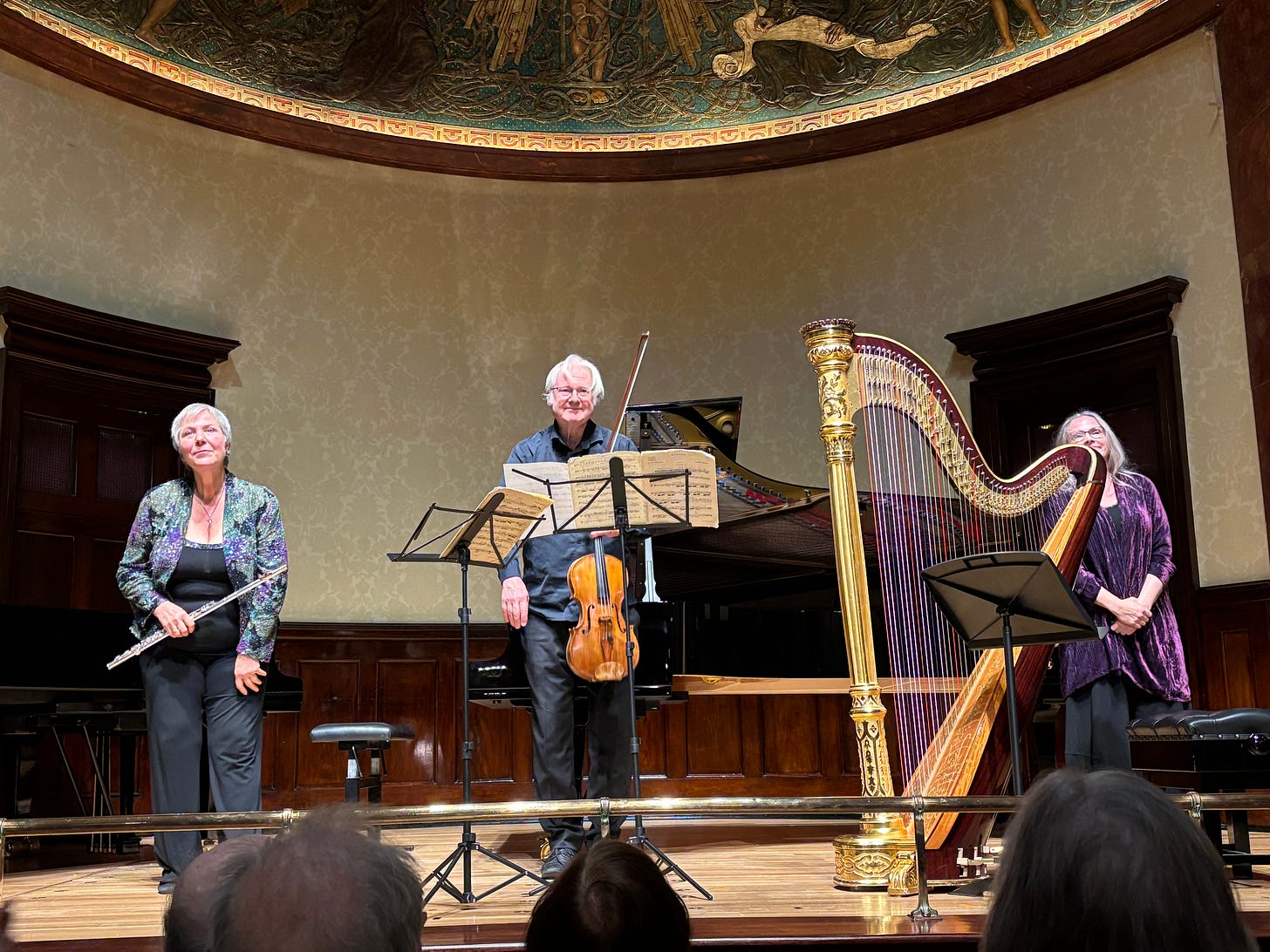I rarely cry at opera these days. There are so many factors that can handicap singers – a director’s concept, the conducting, the sets, the lighting – that even a sublime vocal performance can leave me dry-eyed in an unsympathetic staging. There are exceptions, of course. The final moments of Jenůfa and Bohème both got to me recently, the latter in a production I actively dislike.
I’m much more likely to turn on the waterworks when listening to non-vocal music. Not because the music is sad or has poignant personal associations, but because it is so beautiful or the performance is so uplifting. Happy tears. The Budapest Festival Orchestra had me in bits last autumn because they played – and sang their encore – with such affection for the music and with such collegiate spirit. I felt it again this weekend at Wigmore Hall.
The Nash Ensemble celebrates its 60th anniversary this season. In the autumn, I interviewed its formidable founder, Amelia Freedman, for Score, the in-house Friends magazine. Now well into her 80s, she’s still the ensemble’s artistic director and talked about putting together a season of their favourite works and rediscoveries from the past six decades. I duly resolved to get along to some of their performances.
In November, there was a splendid evening of English chamber music. This weekend, Saturday was devoted to French music, followed by a Sunday morning “coffee concert” of Beethoven and Tchaikovsky (“coffee” meaning “Sherry” for most Wiggy patrons – the stampede of pensioners at the end to get to their tipple would put wildebeest to shame).
For Saturday evening’s two programmes, I had bought tickets in the first few rows. There’s something exciting about being so close to the action, caught in the crossfire between the players. Debussy’s Sonata for flute, viola and harp has long been a favourite chamber work of mine but seeing it from close quarters makes you realise just how violent some of the harp writing is (kudos to the brilliant Lucy Wakeford). Lars Anders Tomter, stepping in for his Nash colleague Lawrence Power, brought animation to the gruff viola role, and Philippa Davies played with panache, as she did in Syrinx, which was played off-stage, just as it was by Louis Fleury in its debut as La Flûte de Pan in play Psyché.
The richly varied main evening programme required lots of action for the Wiggy stage management, juggling the logistics of two grand pianos, a harp and a xylophone (the evening concluded with a zingy Carnival of the Animals) on its small platform. With a 22:15 finish time, the audience certainly wasn’t short-changed
Sunday’s morning recital was played to a packed house including Alfred Brendel, in to watch son Adrian (cello) just as he had been on Saturday evening. Tomter also took his seat in the hall with Power back in situ. Beethoven (the Second “Razumovsky” Quartet) was terrific, but it was the Tchaikovsky that got me.
The Souvenir de Florence was composed for string sextet – pairs of violins, violas and cellos – although it sometimes gets trotted out in a string orchestra arrangement, just as is the case with another favourite sextet, Schoenberg’s Verklärte Nacht. I much prefer the chamber originals. Despite its title, Tchaikovsky’s Serenade is not a travelogue; one of its principal themes was jotted down while the composer was in Florence writing his opera Pique Dame. The finale is a hale and hearty Russian theme, thus a nice concert partner for the Razumovsky. “Italy is beginning to cast her magic spell on me,” Tchaikovsky wrote. “But in spite of the enjoyments of life in Italy, in spite of the good effect it has upon me – I am, and shall ever be, faithful to my Russia.”
Watching the Nash dig into this work with such vigour was thrilling. The opening is one of the most uplifting themes I know, guaranteed to raise my spirits. Although the principal melodies are given to Violin I, Viola I and Cello I, the other three parts are not neglected and there’s a real sense of a conversation throughout. I loved the players’ delight as the musical argument ricocheted between them – Brendel and fellow cellist Gemma Rosefield grinning at each other as they brought off a perfectly timed exchange – and the feeling that they were all having genuine fun up there. That was when my heart burst and the tears flowed.





